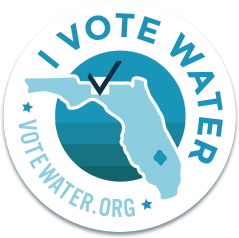Candidate Profile
Endorses
Sandra Sullivan
County Commissioner District 4 - REP

2022 General - Voter Guide Ranking
- Candidate
- Q1
- Q2
- Q3
- Q4
- Q5
- DM
- Rating
Sandra Sullivan
County Commissioner District 4 - REP
2022 Clean Water Questionnaire Responses
To read each question, answer and candidate comments click below.
- Question 1 : Yes1) The application of biosolids to farmland has been implicated in water pollution and harmful algal blooms in the St. Johns River and Big Cypress Lake. While temporary bans on the application of biosolids have been enacted, your county has not permanently banned the practice. Do you favor a permanent ban on the application of biosolids in your county?
Yes
- Question 2 : Yes2) Though water quality in the Indian River Lagoon is improving, seagrass continues to die and imperil the endangered manatee populations. There's a growing consensus that the continued use of herbicides like Glyphosate (Roundup) may play a role in this; and a 2021 scientific study found Glyphosate in more than half of all Florida manatees sampled. Do you support banning spraying herbicides in waters (canals, streams and creeks) entering the Indian River Lagoon?
Yes
Candidate Comment:
In 2009 that aerial extend of seagrass meadows looked as good as 1943, in 2010 the seagrass started to decline corresponding to the state laying off 1300 workers doing mechanical harvesting of aquatic weeds and switching to broadcast spraying of herbicides. I have seen them spray the ditches on SR513 with Aquastar (58% glyphosate) which drains to lagoon and had 117 manatees in them this winter. In 2011, FDEP published that something more than nutrient loading was killing seagrass. The County increased herbicide budget by 2.5x in Oct 2021; even though Counties with bans have their lagoon portion getting better.
- Question 3 : Yes3) State legislation, FDEP data and the Blue-Green Algae Task Force all report agriculture as the dominant source of phosphorus and nitrogen within most impaired watersheds of Florida. Do you agree industries and property owners should be held to clearly enforceable pollution standards and penalties; including mandatory adoption and verification of best management practices, and to implement inspection programs targeting septic, agriculture and industrial wastewater?
Yes
- Question 4 : Yes2) Florida is booming, with an estimated 1,000 people moving here every day. As a result, development is pushing growth further into Florida’s rural and natural areas, imperiling wildlife and natural resources like clean water. Will you oppose changes to your county’s Comprehensive Plan/Urban Development Boundary that would allow non-agricultural development in rural areas outside the urban, most densely developed area(s) in your county?
Yes
Candidate Comment:
Comp Plans are not enforceable as they are now - if a city or county wants to change something it is a rubber stamp even if it violates state statute, i.e. barrier island critical evacuation deficiency is ignored. We need State agency Dept of Community Affairs (DCA) back - abolished in 2012. We need growth management at the state back to enforce state statutes for Comp Plans to be meaningful again. I would appose changes to Comp Plan that impact our water resources, would strengthen our wetlands protection, and add stronger low impact development to our ordinances. We need to protect our wetlands and natural areas. It is heartbreaking to see the heart and soul of Florida (wetlands) being developed. Last month the state approved CFX going through Split Oak Conservation lands so they can develop all land to Brevard border and they won't stop there. This is our water basin, and the future of our drinking water source not to mention wildlife corridor.
- Question 5 : Yes5) The Clean Waterways Act, passed in 2020, compels county governments and municipalities to resolve excess nutrient loading from septic and antiquated wastewater treatment systems. These pollution sources continue to adversely impact the health of the Northern Indian River Lagoon Complex (Indian River, Banana River, Mosquito Lagoon). Will you prioritize, in partnership with the state, the funding of wastewater treatment infrastructure and advocate for septic to sewer conversion requirements to meet the law’s standards?
Yes
Candidate Comment:
There are some places that advanced septic is more important than getting on sewer in this County. Not just nutrient loading but also pollution sources such as PFAS. We need to have more changes by the state to require all our military installations to test for pollution coming off the bases. While I support our military, they are our worst polluters.


Candidate Comment:
Yes, the heavy metals, PFAS, and diseases carried by biosolids on the floodplains of our river not only is fueling algae blooms (arsenic is phosphorous food source for example), but the pollution impacts the wildlife (turtles dying for example), and humans alike (river is our drinking water source). The headwaters when the biosolids are mostly going have frequent algae blooms sadly.